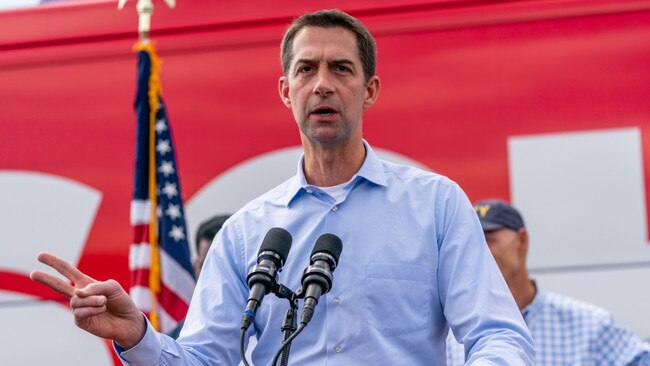New York Times intolerant of half the US, former opinion editor says
The leading newspaper has become intolerant of half the US, says James Bennet, who resigned in 2020 after a backlash to the publication of a column by a Donald Trump ally.

The leading newspaper in the United States has become intolerant of the views of half the country it covers and no longer trusts its readers enough to present them with alternative opinions, a former editor at The New York Times has argued in a scathing essay.
James Bennet, a veteran reporter at the newspaper who was appointed editor of its opinion pages in 2016, resigned four years later after a backlash from colleagues over his decision to publish a column by a Republican senator and ally of then president Donald Trump.
Writing in The Economist, Bennet argues that the tendency towards “liberal bias” at The New York Times, long raised by its critics, has now “metastasised … to illiberal bias, from an inclination to favour one side of the national debate to an impulse to shut debate down altogether”.
He said guardrails at the paper between news reporting and opinion had broken down, and many journalists there were now committed not to truth but to “social justice” and “do not believe readers can be trusted with potentially dangerous ideas or facts”.
Bennet said the paper was “losing control of its principles”, as well as the trust of many Americans, just as it faces “the severe test posed by another Trump candidacy and possible presidency”.
He offered this warning in a lengthy essay that also offered his first full account of the backlash inside the paper against the publication of a column by the Republican senator Tom Cotton.

Cotton’s column, headlined “Send in the Troops”, argued that in the midst of peaceful protests against the killing of George Floyd, some criminals were engaging in an “orgy of violence” and the military should be deployed “to disperse, detain and ultimately deter lawbreakers”.
After it was published, a chorus of journalists at the paper claimed on social media that publishing the piece put black members of staff “in danger” and the paper’s union claimed that it “jeopardises our journalists’ ability to work in the field safely and effectively”.
Bennet claims that a media reporter at the paper, who called on his colleagues in internal messages to issue a strong condemnation of the opinion piece, was then involved in writing a report about it for the news pages that falsely claimed that Cotton had called on the military to suppress protesters, rather than rioters.
Adam Rubenstein, an editor who had worked on Cotton’s piece, became a target of the backlash, Bennet writes.
Appearing before a staff meeting, while “still struggling with what I should apologise for”, he expressed regret “for the pain my leadership of Opinion had caused”.
That Sunday, the paper’s publisher, AG Sulzberger, called him at home and “with an icy anger that still puzzles and saddens me, demanded my resignation”, he writes. Bennet casts himself as an old hand at the newspaper who started there in 1991 and reported from Detroit, Washington DC and the Middle East, where he interviewed Hamas leaders. Leaving the paper in 2006, he returned in 2016 and found it greatly altered, he writes. Convinced that opinion journalism should “foster diverse and inclusive debate”, he began to feel like a Japanese soldier on a Pacific island, “fighting a battle that was already lost”.
When he decided to fill the opinion pages with letters from Trump supporters on the anniversary of the former president’s inauguration, he had to face “an angry internal townhall”, he writes. Conservative writers complained to him of suffering abuse from colleagues: one editor even suggested that conservative columns should come with a “trigger warning”, he writes.
His account of the backlash at The New York Times over Cotton’s piece is broadly in line with accounts from other ex-employees. Shawn McCreesh, who worked on the opinion pages at the time, said the backlash came not from reporters covering the protests but from “tech and audio staffers” and journalists on the arts and leisure sections.
A spokeswoman for the paper did not respond to a request for comment.
The Times







To join the conversation, please log in. Don't have an account? Register
Join the conversation, you are commenting as Logout